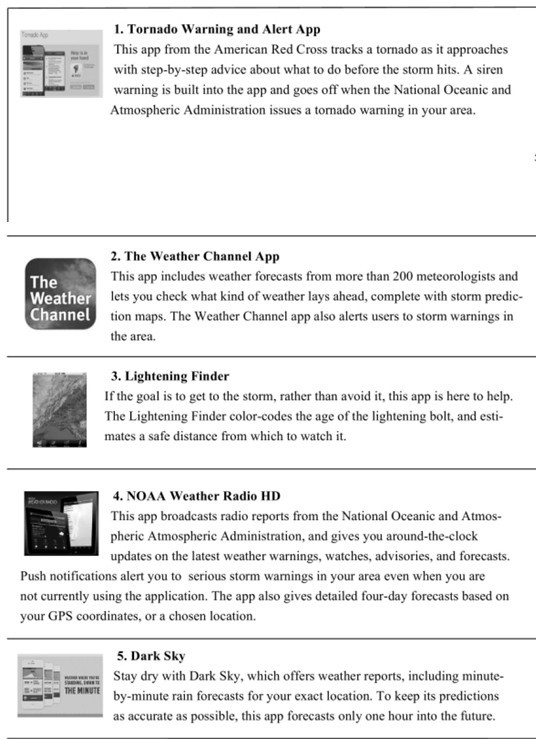第三部分 閱讀理解(共15小題;每小題2分,滿(mǎn)分30分)
請(qǐng)認(rèn)真閱讀下列短文 ,從短文后各題所給的A.B. C.D四個(gè)選項(xiàng)中 ,選出最佳選項(xiàng)
A
Check out our top 5 weather apps(應(yīng)用程序)for your smart phones, which will keep you one step ahead of nature.

56. If you want to keep track of daily weather changes, you may choose
A. Lightening Finder B. The Weather Channel App
C. Tornado Warning and Alert App D. NOAA Weather Radio HD
57. Which of the following is true about Dark Sky?
A. It is especially suitable to predict wet days.
B. It provides more services than the others.
C. It only offers accurate prediction for your area.
D. It keeps you aware of the weather days ahead.
58. The main differences of the five apps lie in
A. users' phones B. users' locations C. their images D. their functions
B
Not very long ago, the question would have seemed absurd. Now it is on the lips of respected scientists; MPs(議員) are beginning to talk of "a war on sugar", and even England's chief medical officer has said sugar may have to be, like the old enemy tobacco, taxed in order to
protect the nation's health.
There came a time in the evolution of public attitudes to smoking, when the doctors had been shouting for long enough that the public was broadly aware of the risks and the only question left,for Government was: what should we do about it?
Some believe we are now at the same point in our attitudes to sugar. Others - largely but not only representatives of the food and drink industry - say the entire debate has been skewed,(歪曲) by those who spread stories deliberately to make people nervous.
More or less everyone agrees that eating too much sugar is bad for you. There is also no doubt obesity is a growing problem which is putting a significant, avoidable burden on the NHS by increasing the rates of diabetes, heart disease and other long-term conditions.
But to what extent is sugar - rather than saturated fats, or salt, carbohydrates or proteins, or any of the other devils of modem diets - the cause of obesity and how much should we worry about it?
Yesterday, hopes of achieving anything resembling clarity(清楚) from the World Health Organization (WHO) were confused once again, which, widely expected to reduce the recommended sugar intake by a half in new draft guidance, instead said it would continue to recommend that sugar make up no more than 10 per cent of the energy we consume, while adding that cutting this to five per cent would have "additional benefits". The decision will now go out to public consultation.
Simon Capewell, professor of the University of Liverpool, said that he suspected "dirty work" on the part of food and drinks companies might lie behind the WHO's less than resounding message.
"The food industry say Government has no business interfering(介入) in families, we must protect personal choice," Professor Capewell said. "We say there is no personal choice. At the moment, a mother can walk into a supermarket with a choice of four tomato soups - with three, or four, or five teaspoons of sugar in them. She has a choice of thousands of ready meals – with five, or six, or even nine teaspoons of sugar in."
59. By referring to smoking the author indicates that
A. sugar has just turned out to be as harmful as smoking
B. it is not easy for authorities to restrict or ban something
C. it is easy for people to see bad effects of something
D. people must see the disadvantages of sugar immediately
60. WHO has changed its idea mainly because
A. it thinks the danger of sugar to health is overemphasized
B. it finds it safe to take in as much sugar as people do now
C. it believes certain amount of intake of sugar does us good
D. it has been put under pressure by food and drinks companies
61. When reporting the argument about sugar, the author seems to
A. remain objective B. stand by those against it
C. believe it harmless D. hold the view of "wait-and-see"
62. Which of the following can be the proper title for the passage?
A. Is sugar the new evil? B. How much sugar do you take daily?
C. Is sugar to be taxed? D. How much do you know about sugar?











